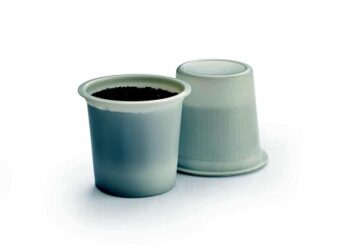Researchers led by Jinwoo Lee and Seung Hwan Ko at Georgia Institute of Technology and Seoul National University in South Korea, have come up with a smart paper packaging with built-in sensors could offer real-time warnings of spoiled food or temperature conditions likely to cause spoilage, according to a research published in Applied Materials Today.
With around 600 million people affected and upwards of 400,000 deaths every year caused by food poisoning, real-time sensors for monitoring food freshness are highly desirable.
“We [have] developed a paper-based food spoilage detection sensor… that can monitor food temperature and spoilage gas concentration at the same time,” says Ko.
According to the publication “The team uses laser patterning to produce laser-induced graphene (LIG) on the surface of commercially available paper packaging including colored paper, paper bags, paper cups, and milk cartons. Continuous-wave laser irradiation creates a layer of porous graphene from cellulose fibers in paper via a photothermal pyrolysis effect, with the depth and dimension of the graphene controlled by the beam intensity and scan speed. The high-surface area of the LIG forms the basis of sensors sensitive to the gas trimethylamine (TMA), which is produced by protein-rich foods during decomposition, down to a detection limit of 5-40 ppm”.
“Graphene has the capability to sense both temperature and amine gas at the same time,” points out Ko. “Both the temperature of food and [presence of TMA] are key indicators that allow us to perceive and predict the status of food.”
“Laser-induced paper sensors (LIPS) can be produced on any type or shape of paper packaging without additional processing or extra electronics. As proof-of-concept, the researchers integrated LIPS into the interior surface of a milk carton, to monitor the presence of TMA, and onto the exterior of a paper cup to detect temperature. Incorporating a Bluetooth wireless communication platform allows information to be relayed to a mobile device for easy monitoring.”
“Our work is not only capable of monitoring the key indicators for food spoilage in real time, but offers a completely eco-friendly platform based on paper,” says Ko. “Along with its biodegradability, paper is ubiquitous… and very cheap.”
The researchers are certain that their technology will be useful to the food industry as manufacturers move away from plastic materials. Paper-based graphene sensors could be a step towards simple, green electronics for other applications in healthcare too.

















